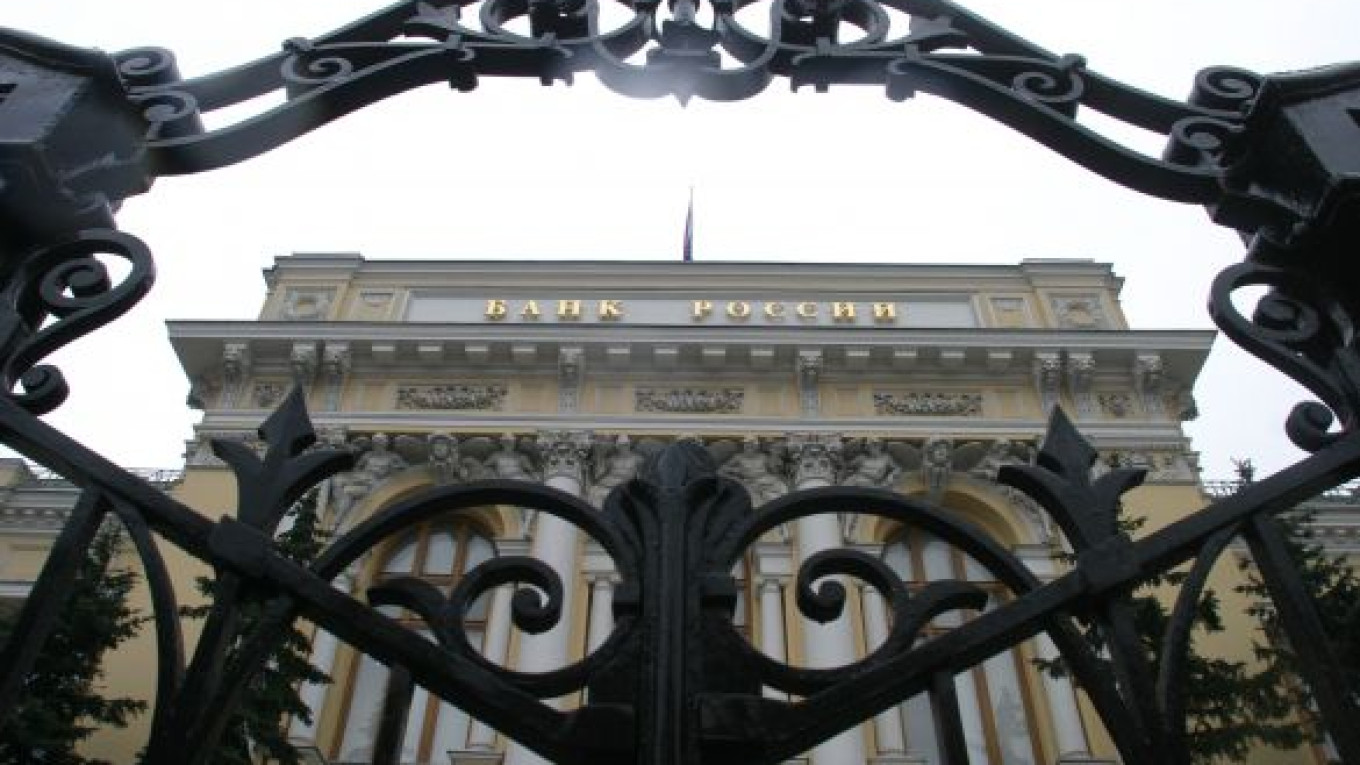The Central Bank has foiled an attempt to steal 1.25 billion rubles ($44 million) from the state’s Pension Fund using counterfeit documents, a scheme that bankers say couldn’t have been carried out by ordinary criminals.
The Pension Fund discovered the theft Monday when it received a notice from the Central Bank that 1.25 billion rubles had been transferred from its account, Marita Nagoga, a spokeswoman for the fund, said Tuesday. She said the Pension Fund had made no such request to the Central Bank, which holds the fund’s accounts.
The Pension Fund said the transactions were carried out after the Central Bank received two counterfeit payment orders, with fake signatures and stamps from the fund. The purported swindlers went to the bank’s Moscow Branch No. 5 on Friday evening, where they first managed to transfer 1.25 billion rubles, set aside for construction and planning work, to the Pension Fund’s account with the Central Bank. Then they made a second transfer, moving those funds to an account controlled by Spetstekhprom at Kuban bank, an Interior Ministry source said.
The two transfers were completed Friday, and on Saturday the criminals began transferring the funds to a variety of different banks, including some abroad. By Tuesday evening, the Central Bank had managed to block the transfers and return the money to the Pension Fund.
A secretary at Kuban, who only gave her first name, Irina, told Vedomosti that the bank’s managers could not speak to journalists because they had all been taken away for questioning after their office was searched.
Kuban has existed since 1989, but little is known about the lender, which doesn’t have a web site. According to the Interfax-100 bank ratings, Kuban has assets of 223 million rubles ($7.75 million) and capital of 42 million rubles, and it is not part of the state’s deposit insurance system.
Alexei Frenkel, a banker convicted last year for organizing the 2006 murder of Central Bank First Deputy Chairman Andrei Kozlov, listed Kuban among the banks that he said were unfairly denied access to the deposit insurance program because they were suspected of money laundering.
The bank was led by Marina Burova for several years, but her place was recently taken by Vladimir Zasorin, according to the Bankrange.ru industry portal.
A bank executive said it was possible that the lender was purchased before the attempted theft in order to carry out the heist. Vedomosti was not able to confirm with the Central Bank the changes in management or the possible change in ownership at Kuban. People who answered the bank’s telephones declined to identify the lender’s director.
If the Central Bank believed that a bank was being used to steal money, it could block the lender’s correspondent account, said Andrei Yegorov, first deputy chief of SB Bank. Then cash could only be withdrawn in person, but the criminals either decided not to do that, or the bank was not the end point for the theft, he said.
The Central Bank sees all ruble transactions within the country, and it takes several days for ruble payments to go abroad, which means the regulator has plenty of time to look into them, said a vice president at another bank.
The bankers said they were baffled, however, that the swindlers were able to bring counterfeit payment orders to the Central Bank.
All banks are Central Bank clients, and officials at several lenders explained how things work at the regulator’s offices. Outsiders aren’t even allowed into Central Bank branches, which require a special pass. The passes are typically given to two or three representatives for Central Bank clients who have legal authority to order transactions.
Even if a client gets a new representative, preparing the entry pass takes several days. The electronic system means that it’s easy to see who has entered branches and at what time, one of the bankers said. Additionally, there are video cameras monitoring the work of all Central Bank tellers.
A teller is not required to check the authenticity of a payment order, another banker said. They just look to make sure that the bank managers’ signatures are present and that the stamps match those on record at the bank. As a result, any representative who regularly visits the Central Bank could conceivably counterfeit and deliver faked documents.
Nagoga said all of the Pension Fund’s transactions were done electronically and that no one from the fund brought requests to the Central Bank on Friday evening. A well-informed banker said the Central Bank would not necessarily find anything suspicious about the order, since such payments are not uncommon, but that an unfamiliar representative would likely put a teller on guard.
“The Central Bank has created a commission, led by First Deputy Chairman Georgy Luntovsky, to carry out an internal investigation,” the Central Bank said.
A Message from The Moscow Times:
Dear readers,
We are facing unprecedented challenges. Russia's Prosecutor General's Office has designated The Moscow Times as an "undesirable" organization, criminalizing our work and putting our staff at risk of prosecution. This follows our earlier unjust labeling as a "foreign agent."
These actions are direct attempts to silence independent journalism in Russia. The authorities claim our work "discredits the decisions of the Russian leadership." We see things differently: we strive to provide accurate, unbiased reporting on Russia.
We, the journalists of The Moscow Times, refuse to be silenced. But to continue our work, we need your help.
Your support, no matter how small, makes a world of difference. If you can, please support us monthly starting from just $2. It's quick to set up, and every contribution makes a significant impact.
By supporting The Moscow Times, you're defending open, independent journalism in the face of repression. Thank you for standing with us.
Remind me later.


